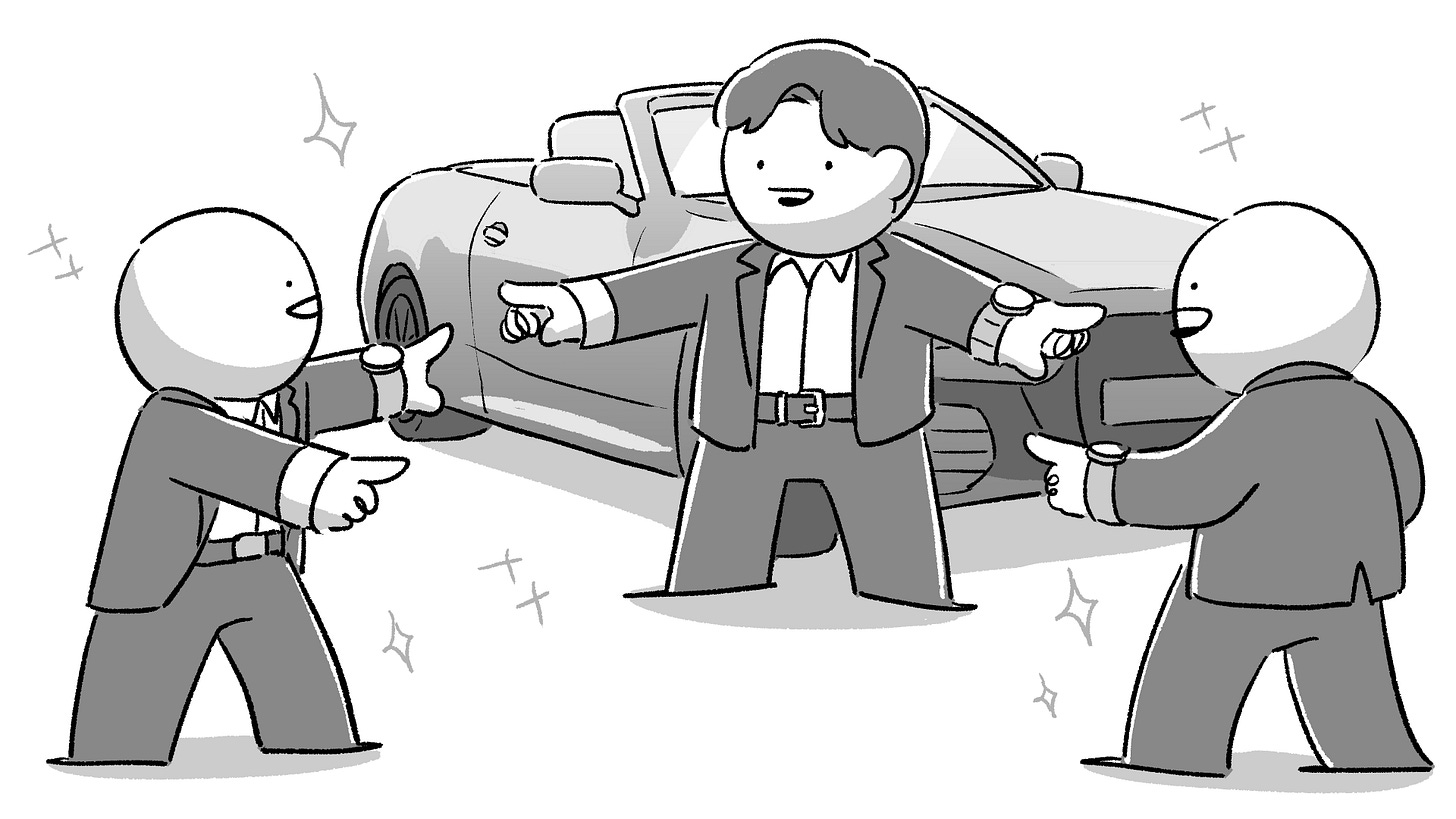Why it makes perfect sense that real estate/insurance agents and FAs are braggy
There's a reason why they're like that.
One of the most enduring stereotypes when it comes to real estate salespeople (RES) and insurance/financial agents (FA), (henceforth referred to as agents) is that they have a tendency to be douchebags.
Or douchebrags, to be more accurate.
When this is a broad and unfair generalisation that might only apply to a minority of professionals, you cannot deny that it’s there.
Consider the archetypical image of an agent:
He wears a suit, drives a BMW, and enjoys the finer things in life.
Occasionally, he adjusts his cufflinks, so you get to spot a glimpse of his Rolex. Patek Philippe, if he doesn’t want to be just another ‘basic’ rich bro. His slicked-back hair towers on the horizon.
The only thing he enjoys more than his material possessions is waving them on social media.
(We’ve used a male agent as an example, but female agents can also perpetuate this).
Why are they like this? Instinctively most of us know the answer:
‘They think that looking successful helps them attract clients.’
But how legitimate is this?
We put ourselves in their shoes and thought we’d offer some explanation of their behaviour:
“Would you trust someone who takes public transport to close a multi-million-dollar deal?”
This is a sentiment I’ve heard over and over again, by non-personal finance enthusiasts.
Here’s the truth: While many readers of this newsletter can appreciate that wealth can also be understated and prudent, most people are not like that.
I’ve met agents who’ve said that they tried being prudent, understated and logical. That didn’t get them any clients. But pictures of fast cars and nice watches did.
Why? There are large portions of society that equate ‘looking wealthy’ with ‘giving good advice.’
The logic is: If an agent looks wealthy, they must earn a lot. If they earn a lot, they must be good at their jobs.
Thus, they should be trusted with your money and can help you reach your personal goals.
In this case, agents are simply adapting to what the market wants; if to be humble is to be hidden, then to be braggy is to be successful.
If you want less braggy and obnoxious agents, then the entire society needs to have a better understanding of wealth.
…
Well, good luck with that.
They’re mirroring who they want to reach
Consider this: You might find constant flashes of luxury annoying and unrelatable, but this life might be ‘relatable’ to certain wealthy social classes or groups.
These are the people who can pay an agent’s commissions to fund their extravagant lifestyle (not you with your $200 per year Integrated Shield Plan – no offence).
And since birds of a feather flock together, mirroring these high-net-worth clients are an effective way to appeal to them.
You? You’re just an unintended audience of their marketing efforts. Collateral damage.
But it’s not just clients...
For the uninformed, agents operate in teams that function similarly to MLM structures.
This is how it works:
If you are an agent, and bring another agent into your team, you get to earn a percentage of what they earn. For example – (5-10% for FAs, 2-5% for RES).
Therefore, the more people you have in your team, the more money you might potentially earn. An agent who has tens of people in their team could earn hundreds of thousands of dollars – even if they don’t sell anything themselves.
To attract others to join their team, many agents market themselves as wildly successful.
How? Yup. Using the same methodology that appeals to clients – humans are not that different after all.
Is there any other way to be a successful FA/Real estate agent?
It’s important to acknowledge that there are plenty of FA/RES who earn a living without being flashy and braggy.
What exact percentage? We can’t tell – since the douchebag group commands more mindshare.
That said, we think it’d definitely take a lot of patience (or privilege) to achieve the same success as the flashier bunch.
It requires patience to build a solid reputation and network over time, without resorting to flashy displays.
It also helps if you're privileged enough to start off with a well-connected network and sufficient resources to sustain your lifestyle while you pursue being an agent.
What to do with this information?
To wrap up, the flashy lifestyle of some real estate agents and financial advisors isn't random.
Often it's a rational response to what the market supports and demands.
The ostentation, the flash, and the bragginess are all manifestations of how society equates success and wealth.
And it's this very equation that these agents are leveraging.
Until we redefine our collective understanding of wealth and success, this 'game' of appearances isn't going to change.
So, when you're feeling annoyed by the next "Rolex-wearing, BMW-driving" agent, remember this:
Don't hate the player, hate the game.
Stay woke, salaryman.
Hi there!
If you’ve been enjoying our content, it’ll mean so much to us if you could invite your friends who enjoy our work to subscribe to our Substack.
If you refer at least 5 friends to subscribe to our Substack, we’ll be mailing you an A5 Print!
Find out more about our referral initiative here
Have a great H2 2023 ahead,
Stay woke, salaryman.
The Woke Salaryman Team










Nice art and insights as always!
I'd like to add that there may be a rational reason to pick a rich real estate agent - reducing counterparty risks.
Before I started working with contracts I assumed that the wording in the contract determined the outcome if one side failed to deliver. Not so! The contract merely sets out the starting point for the next round of negotiations...
The reality is, if the counterparty fails to deliver due to negligence or any other reason, the contract (or even just common law) would entitle you to compensation and damages, or a refund at the least. However, if the counterparty fails to refund you or pay you compensation citing a lack of funds, what can you do? Even if you take them to court, and the judge sides with you, if they truly lack money, they cannot pay you what you are owed. This is what happened to me, with them owing me $13,000...
This means if you sign a contract with someone on low income and with low assets, your contract is effectively worthless, because you can't enforce any terms on that contract.
Obviously it is not feasible for you to check their tax return and bank account before signing a contract with them. However, if they own a luxury car, this allows you to evaluate their financial position by proxy - you can assume that a bank would have inspected several year's worth of tax returns and assets before issuing them a loan to purchase the car. If the bank is willing to risk their money on this person, then maybe this gives you a bit more confidence as well.
And of course, they may try to cheat by leasing a luxury car rather than owning one, etc. But that's why the portrayal of wealth is the full package - the suit, the shoes, the watch, and if one part of the facade doesn't pass muster, then people will get suspicious and lose confidence in them.
---
This also explains some paradoxical behavior where when one party is at an information disadvantage, it can be beneficial to bring a 3rd party (usually a bank) to a transaction even if the bank wasn't needed. Shareholders may prefer the corporation fund a big expansion project through debt rather than retained earnings, because the bank will have its team of analysts pore through the financial projections to determine if they are willing to risk their money on it. A potential homeowner may prefer to get a mortgage when building a new house with a builder rather than paying for it with their own cash, because they know the bank will do their own due diligence on the builder and the building process since it is the bank's money at risk if the builder fails to deliver.
(I just generally like finance, not many people are enthusiastic about it so I am using this as my outlet if you don't mind haha)
This has echoes of the great book 'The Millionaire Next Door'. Flash doesn't really equate to actual reality. I've personally met people worth between 10's and 100's of millions of dollars in both business and casual settings. The richest and most tolerable were those that just don't care about the trappings. You'd have no idea that they were wealthy if you ran across them in the store. The car might be a tipoff but that's about it.